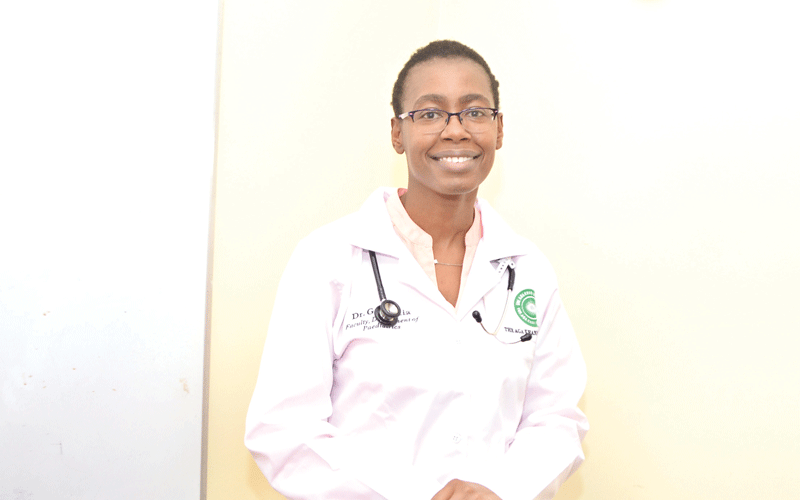What I learnt from child cancer warriors
By Grace Wachira, February 3, 2020Grace Wachira @yaa_grace
Before Dr Grace Mbatia joined paediatric oncology, she was working with children living with HIV/Aids. “I remember people asking why I would willingly choose this field.
I chose these paths because there is hope and children indeed have better outcomes compared to adults,” she begins.
Dr Mbatia, a fulltime paediatric faculty haemo-oncology and transplant specialist at the Aga Khan Hospital, notes that most times, hope is not well sold.
“I am a stubborn optimist and I am not oblivious to the fact that life has its ups and downs, but even with all those variations, there is hope,” she explains.
Having rubbed shoulders with cancer for more than 17 years, she knows too well the ins and outs of paediatric cancer.
“Children are smarter than we think. They are conscious of their surrounding and I know this because children as little as six or eight who come to my office can read and know this is a cancer centre.
They begin to cry even before we talk and it is tough to go through the consult,” she says.
She talks to her patient in an age appropriate way and tells them they are not well.
“I address the babies themselves at their level on my day zero talk. I let everyone go through the motions; parents, grandparents and patients alike.
I avail information to them gradually because that is key,” she affirms.
Paediatric cancer is different from adult versions. “I find myself dealing with young couples who are devastated about the diagnosis and who try to wrap their minds around where the cancer in their children came from. It puts a lot of strain on couples and children,” she adds.
As a doctor, she realises sometimes, other siblings feel left out because their sick sibling is always with the parents.
“My job is to treat, but I cannot turn a blind eye. I rope in the rest of my team, the psychiatrists, nurses, surgeons and we make it more bearable.”
She takes them through the treatment process and even then, the magnitude of the ailment does not sink.
“I have parents who reach out to me years after the children were healed and they still breakdown from the experience,” she said.
Dr Mbatia’s relationships with her patients and family come with the territory. “I break the news and we start the journey together.
I tell them the truth and sometimes we know they will pull through and other understand it is a matter of time. That candid talk makes families appreciate each other,” she says.
Even then, it is never easy when she loses one of her children, as she fondly calls them.
“My daughter, when I go home asks me how my children are because of how dear I hold them.
We are not supposed to cross those lines, but they become part of my life and when I lose one of them, I do not take it well,” she sighs.
As a doctor, she does not have the luxury to breakdown. “I have no right morally to even share in the pain that a mother goes through but all the same, it hits home hard.
Gratitude helps me get through the loss. I am grateful for the opportunity to share in the lives of these children because they are brilliant and make my days with their vibrant and full personalities; one of the perks of the job.
They are resilient little warriors who teach me a lot. The treatment is not child’s play; no pun intended, but they get through it,” she says.
Drawing strength
Ideally, she should separate her two realities and keep her cool but she’s human. Last year, she lost it!
“My little boy left us and I broke down in the children’s ward and you couldn’t tell his mother and I apart.
That one time, I let my guard down and his death hurt me. That particular family is still in touch with me and that keeps me going.
Usually, we have appointments with professional counsellors, but a lot of the time, I talk to my mother who doubles up as my shrink.
I maintain my doctor-patient confidentiality principle and lay it down on my mother. It has heled me that I have my faith as an anchor,” she intimates.
She was working in Cairo until last year and experienced firsthand the role faith takes when fighting cancer.
“If it wasn’t for my faith, I wouldn’t do this job. I am a Christian and I have somewhere to draw my strength from.
In Egypt, the parents would say Insha’Allah Alhamdulillah even when they received bad news and it helped even the parents sail through,” she reiterates.
Even when she sinks into a dark hole, Dr Mbatia pulls herself back up. “We will not kid ourselves; losing a life is hard but, I have an amazing team that look up to me for leadership, if anything, the nurses, surgeons, nutritionists, social workers, parents and the children themselves are the real heroes of the story,” she said.
She receives calls and courtesy calls from parents who keep her up to date with the progress of their children.
“Since children have higher chances of survival because cancer is actually treatable, I receive a lot of encouraging stories, which keep me going.
The other day, I was chatting with one of my teenagers who had concerns since they were resuming school and just talking with them, put their minds on the right track.
I draw my strength from such and the fact that I have the opportunity to plant the seed of hope in my juniors, I keep going.”
